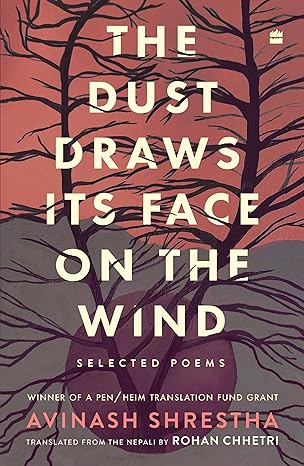"The Dust Draws Its Face on the Wind"
Born on 14 May 1955 in Guwahati, India, Avinash Shrestha went to Nepal for postgraduate studies in 1984, and after a brief return to India moved to Kathmandu permanently in 1990. Heavily influenced by the regional poetry movements in India, Shrestha had already written a book of poems in Assamese and two volumes of his Nepali poetry had been published in Assam. His first published collection of poetry in Nepali, Samvedna, O Samvedna! (1981) established his foothold in the Nepali literary map. His third book, and his first to be published in Nepal, Anubhuti Yatrama, came out in 1990. His most recent full-length collection, Karodoun Suryaharuko Andhakar was published in 2003. A prolific and versatile writer and editor in Nepal with numerous feature film and television scripts, songs and plays to his credit, Shrestha's literary works have been awarded the prestigious Mainali Katha Puraskar, the Nepal Motion Picture Award, the Dhaulagiri Sahitya Puraskar (for the poetry collection Anubhuti Yatrama), and the Yuva Barsha Moti Puraskar among others. In June 2022 he was awarded the prestigious Gopal Prasad Rimal Smriti Samman for his contribution to contemporary Nepali literature. He was the chief editor of the literary magazine Garima, and is the founder and editor emeritus of the Royal Nepal Academy's literary magazine, Samakalin Sahitya. Rohan Chhetri is the author of Slow Startle, and Lost, Hurt, or in Transit Beautiful, which was awarded the Kundiman Poetry Prize. He has also co-edited Shreela Ray: On the Life and Work of an American Master. His poems and translations have appeared in The Paris Review, Poetry London, the Academy of American Poets' Poem-a-Day, and Words Without Borders, among others, and in numerous anthologies including The Forward Book of Poetry 2023 and The Bloomsbury Anthology of Great Indian Poems. His poems have been translated into Turkish, Greek and French. ... Read more Read less
Born in Assam, Avinash Shrestha migrated permanently to Kathmandu in 1990. His first three collections, Parewa: Seto Kala (1977), Samvedna, O Samvedna! (1981) and, particularly, Anubhuti Yatrama (1990) forged a quintessentially modern Nepali diction and imagery and created a stir in the Nepali literary scene. His work brought in influences from the regional poetry movements in India -Assamese, Urdu, Hindi, Bengali – and world poetry, ranging from the French symbolists to the Spanish surrealist Federico García Lorca, into the idiom of Nepali poetry which had, until then, been mired in social critique. His fourth collection, Karodoun Suryaharuko Andhakar (2003), blends his distinct brand of surrealism with themes of climate justice, mourning the ecological degradation in the Eastern Himalayas.
The Dust Draws Its Face on the Wind, translated brilliantly by the award-winning Rohan Chhetri, is the first selection of Nepali poetry to be widely available in English, and maps the oeuvre of one of the most significant contemporary poets writing in the language today.
... Read more Read less










